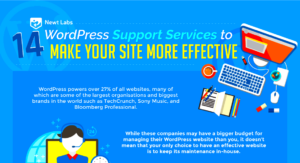WordPress is a name that resonates with millions of website owners, bloggers, and businesses around the world. But when it comes to understanding its status—specifically whether it is a non-profit or not—things can get a bit confusing. In this section, we’ll dig into the relationship between WordPress and non-profit status, clearing up any misunderstandings that might linger.
Understanding WordPress: Overview and Contributions

WordPress started as a simple blogging platform in 2003 and has since evolved into a robust content management system (CMS) that powers over 40% of all websites on the internet. But what exactly is WordPress, and how does it operate?
- Open Source: WordPress is open-source software, which means that its source code is available for anyone to study, modify, and enhance. This accessibility fosters a community-driven approach to development.
- Independent Project: Technically speaking, WordPress itself is not a single organization. It’s managed by a decentralized community of developers and contributors from around the globe, making the project collective rather than profit-driven.
- Commercial Entities: While the core software is free, many commercial products and services exist around WordPress, such as premium themes, plugins, and hosting services. Companies like Automattic, the parent company behind WordPress.com and WooCommerce, operate for profit. However, they contribute a significant amount of resources to the WordPress Foundation.
Contributions to the Community: The WordPress community is incredibly active, with numerous volunteer contributors dedicating their time to improving the platform. The WordPress Foundation, founded by Matt Mullenweg, supports various initiatives to promote open-source projects, educational programs, and more. This means
In summary, while WordPress has significant non-profit aspects through its foundation and community-driven projects, it exists in a broader ecosystem that includes for-profit entities. Understanding this distinction helps clarify much of the confusion surrounding WordPress‘s status.
Defining Non-Profit Organizations
Non-profit organizations (NPOs) are entities that operate for purposes beyond generating profit. Instead, they focus on fulfilling a specific mission that typically benefits the public or a particular community. These organizations rely on donations, grants, and fundraising efforts to support their activities, rather than generating income through traditional business practices.
Let’s break down what defines a non-profit:
- Mission-Driven: Non-profits exist to serve a social cause, whether it’s providing education, healthcare, environmental conservation, or aiding underprivileged communities.
- No Owner Profit: Unlike for-profit businesses, any surplus revenue generated is reinvested into the organization’s mission rather than distributed to owners or shareholders.
- Tax-Exempt Status: Many non-profits qualify for tax exemptions, meaning they don’t pay income tax on the money they receive, allowing more funds to go directly to their services.
- Volunteer Involvement: Many non-profits rely heavily on volunteers. This not only reduces operational costs but also fosters a community spirit among supporters.
It’s fascinating to understand how these organizations function. They often operate through a board of directors, who make strategic decisions. Funding can come from various sources, with donations being a primary contributor. Non-profits strive for transparency because they need to maintain public trust and support.
How WordPress Operates: The Business Model
WordPress is a widely popular content management system (CMS) that allows anyone from hobby bloggers to large organizations to create and manage websites. The confusion surrounding whether WordPress is a non-profit stems from its underlying structure and how it operates.
WordPress is primarily driven by the non-profit organization called WordPress Foundation, which oversees the development of the WordPress software. However, there’s more to the picture:
- Open Source Model: WordPress operates on an open-source framework, meaning anyone can use, modify, and distribute the software for free. This embodies the community-driven spirit typical of non-profits.
- Commercial Enterprises: While the WordPress software itself is free, there are numerous businesses built around it. From hosting services to premium themes and plugins, many for-profit companies thrive on the WordPress ecosystem.
- Community and Volunteers: Much like non-profits, WordPress has a large community of contributors who volunteer their time to improve the software and support users, which adds to its non-profit appeal.
A unique aspect of WordPress’s business model is its dichotomy: it functions on both charitable and commercial levels, making it stand out in the tech world. The WordPress Foundation is dedicated to promoting open-source software without profit motives, while the thriving marketplace surrounding it sustains many individuals and businesses.
The Role of the WordPress Foundation
The WordPress Foundation plays a pivotal role in the ecosystem surrounding WordPress. Established in 2010 by Matt Mullenweg, one of the original developers of WordPress, the foundation aims to ensure that WordPress remains free and open-source. This organization is not just about code; it’s about fostering a community and promoting the software while ensuring it remains available to everyone.
Here are some key functions of the WordPress Foundation:
- Support for WordPress Projects: The foundation supports various projects and initiatives that enhance the WordPress platform, helping to maintain the software’s quality and security.
- Education and Advocacy: It actively educates users about the benefits of using WordPress and advocates for web rights, emphasizing the importance of open-source technology.
- Organizing Events: The foundation plays a crucial role in organizing WordCamps and meetups, which are fantastic opportunities for community members to learn, share, and connect.
- Funding and Grants: The foundation issues grants to projects that align with its mission, providing financial support for innovation and education in the WordPress community.
In essence, while the foundation itself is a non-profit, it works for the greater good of the WordPress ecosystem, ensuring that the platform remains a powerful tool for anyone wanting to establish an online presence.
Common Misconceptions about WordPress and Non-Profit Status
When it comes to WordPress, confusion often arises regarding its non-profit status. Many people equate WordPress itself with the WordPress Foundation, mistaking the software for the organization. Here are some of the most common misconceptions that need to be cleared up:
| Misconception | Clarification |
|---|---|
| WordPress is a non-profit. | WordPress is an open-source software. While the WordPress Foundation is a non-profit, the software itself is developed and maintained by both individuals and companies. |
| All WordPress-related activities are non-profit. | Many businesses use WordPress to offer premium services, plugins, and themes for profit. The WordPress ecosystem includes commercial interests that support development. |
| Using WordPress means you’re supporting a non-profit. | While using WordPress does indirectly support the Foundation’s mission, many WordPress users are not aware that companies or organizations can profit off the software. |
Understanding these misconceptions helps to clarify the distinction between the WordPress software, which is a powerful tool, and the WordPress Foundation, a non-profit organization dedicated to education and advocacy. So, while WordPress enables commercial ventures, it also provides a framework for a vibrant non-profit community!
7. Comparing WordPress to Other Non-Profit Entities
When we think about non-profit organizations, several examples might spring to mind, like charities, educational institutions, or community service organizations. But how does WordPress stack up against these traditional non-profits? Let’s break down some of the key comparisons.
Mission and Purpose: Non-profit entities generally exist to serve a public or community interest without the motive of making a profit. Similarly, WordPress’s mission is to democratize publishing by making it easy for anyone to create and manage websites. This mission aligns its operations with that of non-profits, emphasizing community-driven initiatives.
Funding Sources: Traditional non-profits often rely on donations, grants, or membership fees. In contrast, while WordPress benefits from donations, it primarily generates revenue through other channels, such as premium services and partnerships. This diversification allows it to maintain a sustainable model while still operating for the greater good.
| Feature | WordPress | Traditional Non-Profit |
|---|---|---|
| Mission | Democratizing publishing | Public or community benefit |
| Funding | Donations, premium services | Donations, grants, memberships |
| Community Involvement | High | Essential |
In essence, while WordPress shares some commonalities with traditional non-profit entities, it operates in a unique spectrum, blending aspects of non-profit ethics with a business-like approach. This combination makes understanding its status a bit confusing, but also uniquely powerful.
8. Implications of Non-Profit vs. For-Profit Models
Understanding whether WordPress fits into a non-profit or for-profit model carries implications that resonate across various aspects—from its community impact to its financial sustainability.
Community Impact: Non-profit organizations often prioritize serving communities and fostering positive social change. WordPress adheres to this principle by providing access to free resources, thereby empowering millions of users worldwide. The lack of a profit motive means that the community remains at the forefront of its initiatives.
Financial Sustainability: A non-profit model can sometimes struggle with funding consistency. Conversely, a for-profit entity can reinvest profits to enhance services and expand reach. WordPress thrives in a hybrid model, deriving income from a mix of donations and premium services to sustain its operations while still fostering community benefits.
Some implications of choosing between the two models include:
- Accountability: Non-profits are generally held to higher standards of transparency and accountability.
- Tax Benefits: Non-profit status often comes with tax exemptions, which can influence financial allocation.
- Growth Opportunities: For-profit models can pursue aggressive growth strategies that non-profits might avoid due to their mission-focused nature.
In summary, the implications of being framed as a non-profit versus a for-profit model affect everything from mission fulfillment to financial health. This nuance helps clarify why the categorization of WordPress may spark confusion, but also positions it as a powerful player in both the tech and social realms.
Conclusion: Clarifying WordPress’s Position
WordPress, as a platform, often faces misconceptions regarding its operational model. Although there is a free and open-source version of WordPress available to users worldwide, it is essential to clarify what this means in terms of profit and organizational structure.
Here are several key points that help clarify WordPress’s position:
- Open Source Software: WordPress is primarily an open-source content management system (CMS). This means that anyone can download, use, and modify the software without any cost.
- WordPress Foundation: The WordPress Foundation is a non-profit organization that supports the growth of WordPress and ensures the project’s ongoing development. However, the foundation does not directly profit from the platform’s usage.
- Commercial Ventures: Many businesses leverage the WordPress ecosystem for profit, such as hosting services or premium themes/plugins. These entities operate independently of the WordPress Foundation.
- Community Contributions: Numerous developers and enthusiasts contribute to WordPress’s development voluntarily, fostering a sense of community rather than profit-driven motives.
In summary, while WordPress as a platform offers free access and is supported by a non-profit foundation, it also comprises a broader ecosystem that includes for-profit ventures. Understanding this duality helps to appreciate WordPress’s unique position within the digital landscape.



